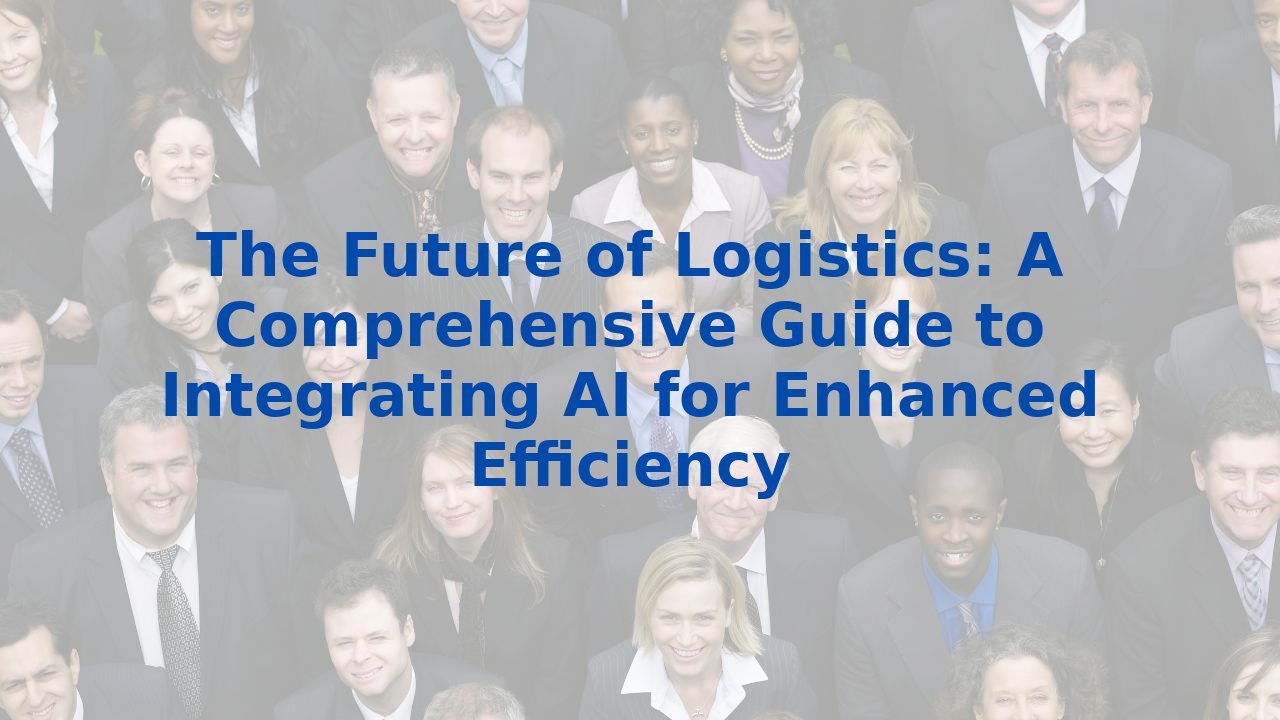The Future of Logistics: A Comprehensive Guide to Integrating AI for Enhanced Efficiency
The Future of Logistics: A Comprehensive Guide to Integrating AI for Enhanced Efficiency
Introduction
In the fast-paced world of logistics, the pressure to optimize operations and enhance customer experiences never ceases. This relentless pursuit for efficiency has led many organizations to explore the transformative power of Artificial Intelligence (AI). By integrating AI into their logistics processes, companies are not only streamlining operations but also paving the way for a future filled with innovation and improvement.
The Role of AI in Logistics
AI is no longer just a futuristic concept; it has become an essential part of modern logistics, enabling companies to automate mundane tasks, analyze vast troves of data, and make data-driven decisions that reshape business strategies. Let’s delve into a few key areas where AI is making a significant impact:
1. Predictive Analytics
Imagine having the ability to anticipate needs before they arise. With AI algorithms analyzing historical data alongside real-time information, logistics companies can accurately predict demand and optimize inventory management. This predictive capability prepares organizations to tackle challenges proactively, paving the way for smoother operations and enhanced customer satisfaction.
2. Route Optimization
The logistics industry is driven by the need for speed and cost-efficiency. AI excels in real-time route optimization, considering factors like traffic conditions, weather patterns, and road integrity. By ensuring faster delivery times and reduced fuel consumption, companies can enhance customer satisfaction while minimizing environmental impact.
3. Automated Processes
AI empowers organizations to automate repetitive tasks—whether it’s data entry, tracking shipments, or generating reports. This shift frees human resources to engage in more strategic, high-impact activities. Furthermore, automation reduces the frequency of human errors, boosting overall accuracy in operations.
4. Enhanced Customer Experience
In today’s market, superior customer experience is non-negotiable. AI-driven systems provide real-time updates to customers, enabling them to track shipments while receiving personalized notifications. This transparency strengthens customer loyalty and trust, which are invaluable in the competitive logistics landscape.
The Benefits of AI Integration
Incorporating AI into logistics doesn’t just facilitate processes; it unlocks a treasure trove of benefits:
1. Cost Reduction
Through optimized routes, minimized fuel consumption, and automation of manual tasks, AI can lead to substantial cost savings. These financial resources can be reinvested into critical areas of the business, such as technology upgrades and comprehensive employee training programs.
2. Improved Efficiency
AI dramatically enhances operational efficiency by minimizing the necessity for manual interventions and present real-time insights that guide decision-making. This leads to empirical improvements across the board, creating a ripple effect that promises long-term gains.
3. Enhanced Customer Satisfaction
With AI’s capability to provide accurate and timely updates regarding shipments, customer satisfaction reaches new heights. In an era where customer expectations are evolving, delivering exceptional experiences becomes crucial to building lasting relationships.
Training Employees for AI
While AI equips companies with powerful tools, its success hinges on the proficiency of the workforce adopting these technologies. Properly training employees in AI is not merely beneficial; it’s essential:
1. Effective Utilization
Training ensures that employees can maximize the capabilities of AI tools. This encompasses not just technical skills, but understanding how to ask the right questions, create effective prompts, and critically evaluate AI outputs for their relevance and applicability.
2. Ethical Use
Employing AI isn’t without its responsibilities. Training in AI also encompasses ethical considerations surrounding the use of data, privacy issues, and the potential consequences of full automation. By fostering an ethical AI culture, organizations can avoid pitfalls and promote responsible practices.
3. Adaptability
The world of technology is constantly shifting. Employees trained in AI exhibit higher adaptability to new developments, enabling their organizations to seamlessly integrate innovations into current workflows.
Conclusion
The integration of AI in logistics represents a significant strategic advantage that can enhance efficiency, cut costs, and elevate customer satisfaction. By harnessing AI’s capabilities—ranging from predictive analytics to improved customer interactions— logistics companies position themselves as leaders in an increasingly competitive landscape. Moreover, investing in comprehensive employee training ensures that the full potential of these systems is realized, fostering a more efficient, effective, and ethical work environment.
To explore solutions that facilitate your organization's journey into the AI landscape, consider reviewing available training programs designed for workforce integration.



